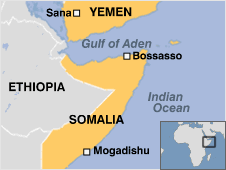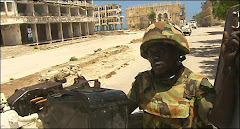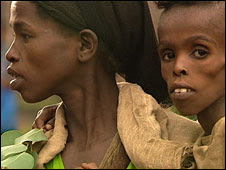As you know, Somalia has been continuously making attempts to rebuild a government. After failing several times, Somalia's latest attempt has been with the transitional government (TFI). As for the individuals of Somalia, they have absolutely no say in what is going on. Their only plan is to escape the dangerous country as fast as possible while taking the chance that they'll die on the way out (we have seen this in Yemen recently as well as in Kenya). As a result of such an obvious problem, UN agencies and nongovernmental organizations seem to be helping where they can.
UN agencies have actually been aware of many of Somalia's problems for a while now. In April of 1992 the Security Council had founded UNOSOM I, whose job was to watch the status of Mogadishu, as well as to protect and provide security for UN personnel. They also supplied equipment and food, bringing them to seaports and airports in Mogadishu. Soon after, UNOSOM expanded to provide protection and supplies to all of Somalia. Eventually in December (1992) Somalia's situation got worse, and so a Unified Task Force (UNITAF) was created in order to further provide safety for materials being delivered for assistance to Somalia. Overall, the two UN agencies worked together to deliver supplies and control major population centers in Somalia. In 1993, UNOSOM II was established to continue support and to help establish peace, but as instability grew and disagreements between countries established they were forced to pull out in 1995. The United Nations Political Office (UNPOS) was established in its place, more specifically to deal with peace among Somalia leaders and the country itself. The UN Security Council has also been making decisions on when it is necessary to get directly involved in the war/attacks. The agencies continue to reveal periodic updates of Somalia's status. Most recently (February of 2007) the UN Security Council organized for African Union peacekeepers to try to create some sort of control in Somalia. In March, the AU peacekeepers arrived in Mogadishu despite the unavoidable war. Unfortunately though, there is much controversy over help offered by UN agencies. In July 2008, Osman Ali Ahmed, head of the UN Development Programme in Somalia (another agency specific for increasing peace and development), was killed in Mogadishu by gunsmen. The Food and Agriculture Organization (FAO), the World Food Programme (WFP), the United Nations Children’s Fund (UNICEF), and more are also all involved in providing food, security, water supply, sanitation, and even education in Somalia.
Nongovernmental organizations are also a huge part of helping in this poverty crisis. Save the Children is one of many organizations that give everyday people the opportunity to sponsor a child and/or donate money to families in Somalia. In December of 2006, Save the Children helped by supplying over 42 tons of mosquito nets, blankets, water containers, and plastic sheets used for temporary shelter. Other NGOs include the Humanitarian Action for Relief and Development Organization (HARDO), Africa Educational Trust (AET), World Vision, Somalia European Committee for Agricultural Training (CEFA), and Women and Child Care Organization (WOCCA)--all of which are looking out for Somalia and are specifically advocating awareness for its devastating humanitarian crisis. It's important that everyday people contribute as well. We can do this by supporting organizations in their quest to find a solution with donations and by sponsoring children. One of the biggest, most helpful things that we can do is to make others aware of the situation. The more people that know, the more help Somalia can get. It's time to think about what's really important-- those new shoes or a person's life?
Sources
"Country Profile: Somalia." BBC NEWS. 18 June 2008. 23 Sept. 2008http://news.bbc.co.uk/2/hi/africa/country_profiles/1072592.stm.
"Statement by 52 non-governmental organizations working in Somalia on the rapidly deteriorating humanitarian crisis." Oxfam International. 7 Oct. 2008. 19 Oct. 2008 http://http//www.oxfam.org/en/pressroom/pressrelease/2008-10-07/somalia-deteriorating-humanitarian-crisis.
"United Nations Political Office for Somalia (UNPOS)." UN Somalia. 19 Oct. 2008. 19 Oct. 2008 http://http//www.un-somalia.org/un_somalia/index.asp.
Subscribe to:
Post Comments (Atom)






No comments:
Post a Comment